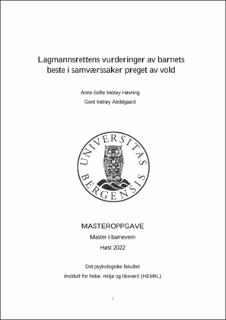Lagmannsrettens vurderinger av barnets beste i samværssaker preget av vold
Master thesis
Permanent lenke
https://hdl.handle.net/11250/3046051Utgivelsesdato
2022-11-18Metadata
Vis full innførselSamlinger
Sammendrag
Barns rettigheter har i lovverket blitt styrket de siste ti-årene når det gjelder medvirkning og beskyttelse mot vold. Imidlertid viser nyere forskning at barn mot sin vilje, må ha samvær med voldelige samværsforeldre. Konfliktfylte samlivsbrudd kan føre til foreldre som ikke blir enige om samvær med barnet. I slike tilfeller kan saken få en rettslig avgjørelse i domstolen. Oppgaven undersøker om lagmannsrettens vurderinger av samværssaker preget av vold, gjenspeiler barnas rettigheter. Barnets beste har forrang dersom det kommer i konflikt med andre prinsipper, og ansees som så viktig at det er Grunnlovsfestet i § 104. Oppgavens fokus har vært på om voldsutsatte barn ble hørt, forstått og fikk sine ønsker hensyntatt i samværssakene i lagmannsretten. Etter søk i Lovdata har vi gjennomgått og foretatt en kvalitativ tematisk dokumentanalyse. Datagrunnlaget består av 21 domsavsigelser fra lagmannsretten fra perioden 2001-2003 og 19 domsavsigelser fra perioden 2019-2021, og omfatter barn i alderen fire til femten år. Våre viktigste funn var at flere barn ble hørt, og vi fant at deres stemme fikk en bredere plass i den siste perioden. Vi fant i tillegg indikasjoner på at lagmannsrettens voldsforståelse har blitt noe utvidet og at psykisk vold så ut til å ha blitt anerkjent som skadelig for barn på linje med fysisk vold i den siste perioden. Videre viste funnene en økning i periode B av barn som fikk samvær, og at flere barn fikk samvær mot sin vilje. Våre funn kan tyde på at barnas voldsfortellinger og ønsker i mindre grad gjenspeiler at barns stemme nå i større grad trekkes frem i domsavsigelsene. Mer kunnskap om barnefaglige spørsmål og skadevirkninger av vold kan bidra til å nyansere bildet og se helheten rundt barnet for slik å søke etter den beste løsningen for det individuelle barnet. Et annet moment kan være innføringen av nye virkemidler i form av beskyttet eller støttet tilsyn under samvær. Vi stiller spørsmål til om innføringen av virkemidlene, som var ment til økt beskyttelse for barna, kan ha ført til et svakere rettsvern for voldsutsatte barn under samvær. Om svaret blir ja – er dette da til barnets beste? Over the last ten years, legislation has strengthened children's rights regarding complicity and protection against violence. However, recent research shows that children, against their will, must spend time with violent biological parents. Conflict-filled family breakups can lead to parents not agreeing on parenting time and visitation with the child, which may require a legal court decision in such cases. This thesis examines whether the Court of Appeal's (lagmannsretten) assessment of visitation cases marked by violence reflects the child's rights. The child's best interests take precedence if it conflicts with other principles and is considered so fundamental that it is enshrined in Section 104 of the Constitution. The focus of this thesis has been on whether abused children were heard, understood and had their wishes considered in visitation cases in the Court of Appeal. After searching in 'Lovdata', we reviewed and carried out a qualitative thematic document analysis. The basis of the data consists of 21 judgments from the Court of Appeal from the period 2001-2003 and 19 judgments from the period 2019-2021 and includes children aged four to fifteen years. Our most significant finding was that the wishes of children listened to were considered broader in the latter period. We also found indications that the Court of Appeal's knowledge and understanding of violence has been somewhat expanded, and psychological violence seemed to have been recognised as harmful to children on par with physical violence. Furthermore, the findings showed an increase in the number of children who were granted visitation, of which more were granted visitation against their will. Our findings may indicate that the children's stories of violence and wishes would reflect a lesser extent that children's voices are brought to the fore more in judicial decisions. More knowledge around professional questions regarding children and the harmful effects of violence can help to diversify the picture and to see the bigger picture around the child in order to search for the best solution for the individual child. Another issue may be the introduction of new measures in the form of protected or supported supervision during visitation. We question whether introducing the measures intended to increase protection for the children may have led to weaker legal protection for children during visitation. If the answer is yes - is this then in the best interests of the child?
